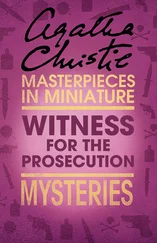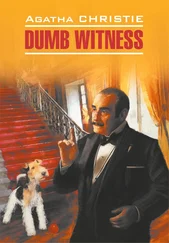Agatha Christie - Dumb Witness
Здесь есть возможность читать онлайн «Agatha Christie - Dumb Witness» весь текст электронной книги совершенно бесплатно (целиком полную версию без сокращений). В некоторых случаях можно слушать аудио, скачать через торрент в формате fb2 и присутствует краткое содержание. Жанр: Классический детектив, на английском языке. Описание произведения, (предисловие) а так же отзывы посетителей доступны на портале библиотеки ЛибКат.
- Название:Dumb Witness
- Автор:
- Жанр:
- Год:неизвестен
- ISBN:нет данных
- Рейтинг книги:5 / 5. Голосов: 1
-
Избранное:Добавить в избранное
- Отзывы:
-
Ваша оценка:
- 100
- 1
- 2
- 3
- 4
- 5
Dumb Witness: краткое содержание, описание и аннотация
Предлагаем к чтению аннотацию, описание, краткое содержание или предисловие (зависит от того, что написал сам автор книги «Dumb Witness»). Если вы не нашли необходимую информацию о книге — напишите в комментариях, мы постараемся отыскать её.
Dumb Witness — читать онлайн бесплатно полную книгу (весь текст) целиком
Ниже представлен текст книги, разбитый по страницам. Система сохранения места последней прочитанной страницы, позволяет с удобством читать онлайн бесплатно книгу «Dumb Witness», без необходимости каждый раз заново искать на чём Вы остановились. Поставьте закладку, и сможете в любой момент перейти на страницу, на которой закончили чтение.
Интервал:
Закладка:
"No inquest was held at the time of her death, since it was assumed that she died from natural causes and a medical certificate to that effect was given by Dr Grainger.
"In a case where suspicion arises after burial has taken place it is usual to exhume the body of the person in question. There are reasons why I have not advocated that course. The chief of them is that my client would not have liked it."
It was Dr Donaldson who interrupted. He said:
"Your client?"
Poirot turned to him.
"My client is Miss Emily Arundell. I am acting for her. Her greatest desire was that there should be no scandal."
I will pass over the next ten minutes, since it would involve much needless repetition.
Poirot told of the letter he had received, and producing it he read it aloud. He went on to explain the steps he had taken on coming to Market Basing, and of his discovery of the means taken to bring about the accident.
Then he paused, cleared his throat once more, and went on:
"I am now going to take you over the ground I travelled to get at the truth. I am going to show you what I believe to be a true reconstruction of the facts of the case.
"To begin with it is necessary to picture exactly what passed in Miss Arundell's mind. That, I think, is fairly easy. She has a fall, her fall is supposed to be occasioned by a dog's ball, but she herself knows better. Lying there on her bed her active and shrewd mind goes over the circumstances of her fall and she comes to a very definite conclusion about it. Some one has deliberately tried to injure – perhaps to kill her.
"From that conclusion she passes to a consideration of who that person can be. There were seven people in the house – four guests, her companion and two servants. Of these seven people only one can be entirely exonerated – since to that one person no advantage could accrue. She does not seriously suspect the two servants, both of whom have been with her for many years and whom she knows to be devoted to her. There remain then, four persons, three of them members of her family, and one of them a connection by marriage. Each of those four persons benefit, three directly, one indirectly, by her death.
"She is in a difficult position, since she is a woman with a strong sense of family feeling. Essentially she is not one who wishes to wash the dirty linen in public, as the saying goes. On the other hand, she is not one to submit tamely to attempted murder!
"She takes her decision and writes to me. She also takes a further step. That further step was, I believe, actuated by two motives. One, I think, was a distant feeling of spite against her entire family! She suspected them all impartially, and she determined at all costs to score off them! The second and more reasoned motive was a wish to protect herself and a realization of how this could be accomplished. As you know, she wrote to her lawyer, Mr Purvis, and directed him to draw up a will in favour of the one person in the house whom, she felt convinced, could have had no hand in her accident.
"Now I may say that, from the terms of her letter to me and from her subsequent actions, I am quite sure that Miss Arundell passed from indefinite suspicion of four people to definite suspicion of one of those four. The whole tenor of her letter to me is an insistence that this business must be kept strictly private, since the honour of the family is involved.
"I think that, from a Victorian point of view, this means that a person of her own name was indicated – and preferably a man.
"If she had suspected Mrs Tanios she would have been quite as anxious to secure her own safety, but not quite as concerned for the family honour. She might have felt much the same about Theresa Arundell, but not nearly as intensely as she would feel about Charles.
"Charles was an Arundell. He bore the family name! Her reasons for suspecting him seem quite clear. To begin with, she had no illusions about Charles. He had come near to disgracing the family once before. That is, she knew him to be not only a potential but an actual criminal! He had already forged her name to a cheque. After forgery – a step further – murder!
"Also she had had a somewhat suggestive conversation with him only two days before her accident. He had asked her for money and she had refused and he had thereupon remarked – oh, lightly enough – that she was going the right way to get herself bumped off. To this she had responded that she could take care of herself! To this, we are told, her nephew responded, 'Don't be too sure.' And two days later this sinister accident takes place.
"It is hardly to be wondered at that lying there and brooding over the occurrence, Miss Arundell came definitely to the conclusion that it was Charles Arundell who had made an attempt upon her life.
"The sequence of events is perfectly clear. The conversation with Charles. The accident. The letter written to me in great distress of mind. The letter to the lawyer. On the following Tuesday, the 21st, Mr Purvis brings the will and she signs it.
"Charles and Theresa Arundell come down the following weekend and Miss Arundell at once takes the necessary steps to safeguard herself. She tells Charles about the will. She not only tells him but she actually shows it to him! That, to my mind, is absolutely conclusive. She is making it quite clear to a would-be murderer that murder would bring him nothing whatever!
"She probably thought that Charles would pass on that information to his sister. But he did not do so. Why? I fancy that he had a very good reason – he felt guilty! He believed that it was his doing that the will had been made. But why did he feel guilty? Because he had really attempted murder? Or merely because he had helped himself to a small sum of ready cash? Either the serious crime or the petty one might account for his reluctance. He said nothing, hoping that his aunt would relent and change her mind.
"As far as Miss Arundell's state of mind was concerned I felt that I had reconstructed events with a fair amount of correctness. I had next to make up my mind if her suspicions were, in actual fact, justified.
"Just as she had done, I realized that my suspicions were limited to a narrow circle – seven people to be exact. Charles and Theresa Arundell, Dr Tanios and Mrs Tanios, the two servants, and Miss Lawson. There was an eighth person who had to be taken into account – namely. Dr Donaldson, who dined there that night, but I did not learn of his presence until later.
"These seven persons that I was considering fell easily into two categories. Six of them stood to benefit in a greater or lesser degree by Miss Arundell's death. If any one of those six had committed the crime the reason was probably a plain matter of gain. The second category contained one person only – Miss Lawson. Miss Lawson did not stand to gain by Miss Arundell's death, but as a result of the accident, she did benefit considerably later!
"That meant that if Miss Lawson staged the so-called accident -"
"I never did anything of the kind!" Miss Lawson interrupted. "It's disgraceful! Standing up there and saying such things!"
"A little patience, mademoiselle. And be kind enough not to interrupt," said Poirot.
Miss Lawson tossed her head angrily.
"I insist on making my protest! Disgraceful, that's what it is! Disgraceful!"
Poirot went on, unheeding.
"I was saying that if Miss Lawson staged that accident she did so for an entirely different reason – that is, she engineered it so that Miss Arundell would naturally suspect her own family and become alienated from them. That was a possibility! I searched to see if there were any confirmation or otherwise and I unearthed one very definite fact. If Miss Lawson wanted Miss Arundell to suspect her own family, she would have stressed the fact of the dog, Bob, being out that night. But on the contrary Miss Lawson took the utmost pains to prevent Miss Arundell hearing of that. Therefore, I argued, Miss Lawson must be innocent."
Читать дальшеИнтервал:
Закладка:
Похожие книги на «Dumb Witness»
Представляем Вашему вниманию похожие книги на «Dumb Witness» списком для выбора. Мы отобрали схожую по названию и смыслу литературу в надежде предоставить читателям больше вариантов отыскать новые, интересные, ещё непрочитанные произведения.
Обсуждение, отзывы о книге «Dumb Witness» и просто собственные мнения читателей. Оставьте ваши комментарии, напишите, что Вы думаете о произведении, его смысле или главных героях. Укажите что конкретно понравилось, а что нет, и почему Вы так считаете.












